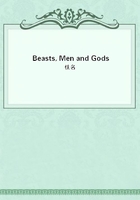
第87章 IN THE BLISSFUL GARDEN OF A THOUSAND JOYS(1)
In Mongolia, the country of miracles and mysteries, lives the custodian of all the mysterious and unknown, the Living Buddha, His Holiness Djebtsung Damba Hutuktu Khan or Bogdo Gheghen, Pontiff of Ta Kure. He is the incarnation of the never-dying Buddha, the representative of the unbroken, mysteriously continued line of spiritual emperors ruling since 1670, concealing in themselves the ever refining spirit of Buddha Amitabha joined with Chan-ra-zi or the "Compassionate Spirit of the Mountains." In him is everything, even the Sun Myth and the fascination of the mysterious peaks of the Himalayas, tales of the Indian pagoda, the stern majesty of the Mongolian Conquerors--Emperors of All Asia--and the ancient, hazy legends of the Chinese sages; immersion in the thoughts of the Brahmans; the severities of life of the monks of the "Virtuous Order"; the vengeance of the eternally wandering warriors, the Olets, with their Khans, Batur Hun Taigi and Gushi; the proud bequests of Jenghiz and Kublai Khan; the clerical reactionary psychology of the Lamas; the mystery of Tibetan kings beginning from Srong-Tsang Gampo; and the mercilessness of the Yellow Sect of Paspa. All the hazy history of Asia, of Mongolia, Pamir, Himalayas, Mesopotamia, Persia and China, surrounds the Living God of Urga. It is little wonder that his name is honored along the Volga, in Siberia, Arabia, between the Tigris and Euphrates, in Indo-China and on the shores of the Arctic Ocean.
During my stay in Urga I visited the abode of the Living Buddha several times, spoke with him and observed his life. His favorite learned Marambas gave me long accounts of him. I saw him reading horoscopes, I heard his predictions, I looked over his archives of ancient books and the manuscripts containing the lives and predictions of all the Bogdo Khans. The Lamas were very frank and open with me, because the letter of the Hutuktu of Narabanchi won for me their confidence.
The personality of the Living Buddha is double, just as everything in Lamaism is double. Clever, penetrating, energetic, he at the same time indulges in the drunkenness which has brought on blindness. When he became blind, the Lamas were thrown into a state of desperation. Some of them maintained that Bogdo Khan must be poisoned and another Incarnate Buddha set in his place; while the others pointed out the great merits of the Pontiff in the eyes of Mongolians and the followers of the Yellow Faith. They finally decided to propitiate the gods by building a great temple with a gigantic statue of Buddha. However, this did not help the Bogdo's sight but the whole incident gave him the opportunity of hurrying on to their higher life those among the Lamas who had shown too much radicalism in their proposed method of solving his problem.
He never ceases to ponder upon the cause of the church and of Mongolia and at the same time likes to indulge himself with useless trifles. He amuses himself with artillery. A retired Russian officer presented him with two old guns, for which the donor received the title of Tumbaiir Hun, that is, "Prince Dear-to-my-Heart." On holidays these cannon were fired to the great amusement of the blind man. Motorcars, gramophones, telephones, crystals, porcelains, pictures, perfumes, musical instruments, rare animals and birds; elephants, Himalayan bears, monkeys, Indian snakes and parrots--all these were in the palace of "the god" but all were soon cast aside and forgotten.
To Urga come pilgrims and presents from all the Lamaite and Buddhist world. Once the treasurer of the palace, the Honorable Balma Dorji, took me into the great hall where the presents were kept. It was a most unique museum of precious articles. Here were gathered together rare objects unknown to the museums of Europe.
The treasurer, as he opened a case with a silver lock, said to me:
"These are pure gold nuggets from Bei Kem; here are black sables from Kemchick; these the miraculous deer horns; this a box sent by the Orochons and filled with precious ginseng roots and fragrant musk; this a bit of amber from the coast of the 'frozen sea' and it weighs 124 lans (about ten pounds); these are precious stones from India, fragrant zebet and carved ivory from China."He showed the exhibits and talked of them for a long time and evidently enjoyed the telling. And really it was wonderful!
Before my eyes lay the bundles of rare furs; white beaver, black sables, white, blue and black fox and black panthers; small beautifully carved tortoise shell boxes containing hatyks ten or fifteen yards long, woven from Indian silk as fine as the webs of the spider; small bags made of golden thread filled with pearls, the presents of Indian Rajahs; precious rings with sapphires and rubies from China and India; big pieces of jade, rough diamonds;ivory tusks ornamented with gold, pearls and precious stones;bright clothes sewn with gold and silver thread; walrus tusks carved in bas-relief by the primitive artists on the shores of the Behring Sea; and much more that one cannot recall or recount. In a separate room stood the cases with the statues of Buddha, made of gold, silver, bronze, ivory, coral, mother of pearl and from a rare colored and fragrant species of wood.
"You know when conquerors come into a country where the gods are honored, they break the images and throw them down. So it was more than three hundred years ago when the Kalmucks went into Tibet and the same was repeated in Peking when the European troops looted the place in 1900. But do you know why this is done? Take one of the statues and examine it."I picked up one nearest the edge, a wooden Buddha, and began examining it. Inside something was loose and rattled.